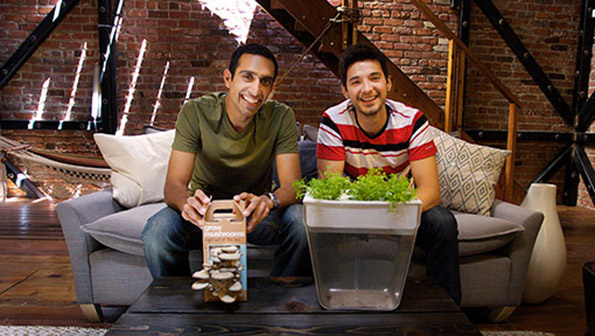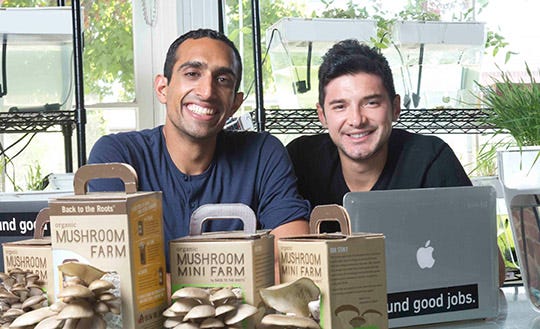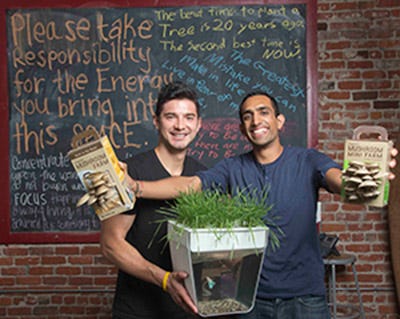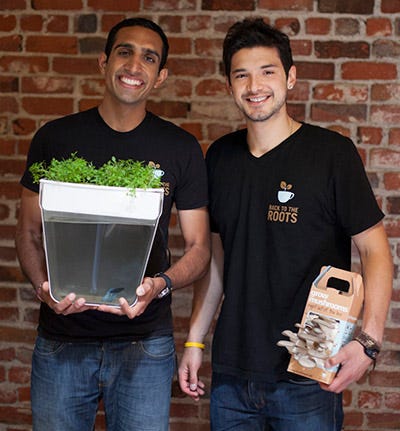It's time to get back to planting seeds. Back to growing food. Back to knowing where your food comes from. It's time to get back to the roots with Nikhil Arora and Alejandro Velez. Cofounders of successful startup company, Back to the Roots, Nikhil and Alejandro enable customers to cultivate and benefit from aqua farms and mushroom farms in the comfort of their own homes.
February 24, 2015

What was the inspiration for your business? What inspires you daily?
We were inspired to start Back to the Roots during our last semester of college. We were both undergraduate business majors with job offers to go into investment banking and consulting when we came across a random fact in class: gourmet mushrooms can grow entirely on recycled coffee grounds!
Our professor introduced the two of us, we hit it off, and after watching hours of how-to videos and turning our fraternity kitchen into a science experiment, we eventually decided to give up our corporate job offers to instead become full-time mushroom farmers. What started as cu
We want to teach families and especially kids that you don’t need a green thumb or a big backyard to grow your own food and know where it comes from! It’s been incredibly inspiring receiving thousands of photos from customers showing them growing mushrooms, harvesting herbs from the AquaFarm and connecting to food. We see the impact this can make, and it inspires us to work harder!
What’s been your road to success and critical success factors along the way?
Don’t be afraid to share! We started the company by sharing our products, dreams, hopes and vision at hundreds of farmers' markets and Whole Foods demos. By putting ourselves out there to hear feedback—the good and the bad—we were able to learn quickly about our customers and what they really want.
Build key partnerships: Whole Foods Market has been an incredible partner (we even got a loan from them through their Local Producer Loan Program). They have become more like mentors than buyers as we’ve co-developed products throughout the product development lifecycle.
Focus on design: Going from the “big, clear bag of fungus with a FedEx label slapped on” to our current Mushroom Kit was a HUGE leap for us in terms of nationwide, mainstream acceptance, velocity in stores, and brand recognition. Investing in our packaging and product was key and something that now has become a cornerstone of our brand: good, clean design!
Launching the AquaFarm on Kickstarter! We had a $100 thousand goal over 30 days and ended up hitting $250 thousand. It was a huge moment for the company that proved we’re not just the “mushroom guys” but a bigger brand reconnecting people to food in new and different ways.
Describe a mistake you made with your business. How did you fix it?
We didn't invest in our brand (packaging design, website etc.) early on. It’s good to be scrappy, but first impressions with your brand can either make or break early customer experiences. Our first Mushroom Kits were not attractive, to say the least. We sold clear bags of fungus that we thought people would proudly put on their kitchen counter. We were wrong!

What’s your best piece of advice for your fellow entrepreneurs?
Your top job is to maintain good health and good partnerships!
Where are you going? What is the vision for your business in 2 years? 5 years? 10 years?
We see a divergence occurring in the natural food space between the "new doing" and the "undoing of food," both of which will grow rapidly.
The "new doing" includes extracts, soy protein isolates, fake meats, fake eggs and Soylent-type concoctions. It's humans "inventing" new food in labs that are deemed healthier for us, and it's getting significant funding from lots of noteworthy technology investors.
The flip side in the future of food, the one that gets us excited and that we're putting every ounce of our energy into, is the "undoing of food." This is how you take food back to what it was 100 years ago by simplifying its ingredients and making the least processed versions. How do we create and promote food that is "made in a kitchen" and not a lab?
Our R&D team isn’t made up of biochemists and food scientists. Instead, it’s our grandparents! We think there's a powerful movement that's just starting around simplicity and undoing. It started in the restaurant space (Chipotle and Sweetgreen, where people wanted to see their food being made) and is now transitioning to the packaged food space. What "organic brands" were for baby-boomers, "transparent/simple" brands will be for millennials and our kids.
Our vision for 5-10 years is to become the “Kraft Foods" for millennials, but done right and with a focus on pure, simple ingredients. We want Back to the Roots to becomes a cross-category brand that when families are looking to connect with real food, whether growing or eating it, comes to mind. We’re betting that of all trends (gluten free, paleo, sugar free, fat free, vegan), what’s going to really stick is just simple food with fewer ingredients.
Food is the most personal thing there is. It’s what we put into our bodies three times a day, and yet we’re disconnected from it and have more trust around “new invented foods.” In comparison, we know what works and that's simple, real food and ingredients. We want to inspire a whole new generation to get excited about this.
What was the first retail account you landed?
The Berkeley Whole Foods store was our first customer.
Has anything surprised you about working with independent retailers?
It’s awesome to see how passionate and demanding independent retailers are for top-quality products and transparency. We feel independents hold us to the highest standards, which we really appreciate.
How do you position your products in mass, natural and online?
We try to position ourselves the same in each channel. We look up to and are inspired by brands like Clif Bar that have been able to work in all channels, from Whole Foods to local gas stations. Good food shouldn’t be exclusive and one set of retailers shouldn’t get a better product tha
We want to keep our brand pillars around simple, pure ingredients no matter where we sell. Our Mushroom Mini Farm, for instance, should be the same whether you buy it in club, at Whole Foods or on the internet. We do have a smaller version of the Mushroom Farm for retail, but it’s the same quality product, just a bit smaller and at a price point we think is accessible to more families.
How do you develop relationships with retailers and educate them about your company’s story?
We’ve had a lot of people ask us “how do you sell retailers/investors on a company or product?” and the answer is easy: sell yourself first. If you believe in a product, your passion, enthusiasm and confidence will shine through. Retail buyers will sense the authenticity and respond well to it. Sell yourself first and the rest will take care of itself.
What most helped market your product in the beginning?
Demos! We built this company with demos and have literally visited almost every Whole Foods in the country.
What’s a guilty pleasure of yours?
Alex: Falling in love too fast.
Nikhil: Watching way too many rap music videos.
Please share the inside scoop on yourself.
We carpool to work together, drive home together, work 7 a.m. -9 p.m. together, and still want to vacation together (with both of our families too!) We’ve been to Europe, Colombia, India and Brazil together.
You May Also Like


